Lip Lesion & Malignant Lip Lesion Treatment NZ by Dr Gittos
A lip lesion is an abnormal tissue that could be benign (harmless) or malignant (cancerous). To avoid future damage to the affected area, you need to undergo a biopsy to determine whether the lip lesion is cancerous or not. Once the status of the lip lesion is known, a lip lesion removal performed by a highly experienced surgeon can be performed. This procedure does not only help achieve an aesthetically-pleasing appearance but also lowers your risk of getting cancer.
Dr Mark Gittos is a specialist plastic surgeon based in Auckland with other clinics around New Zealand and UK. With years of experience, Dr Gittos can remove your lip lesion and give you a better aesthetic result.
Reasons for Having a Lip Lesion Removal
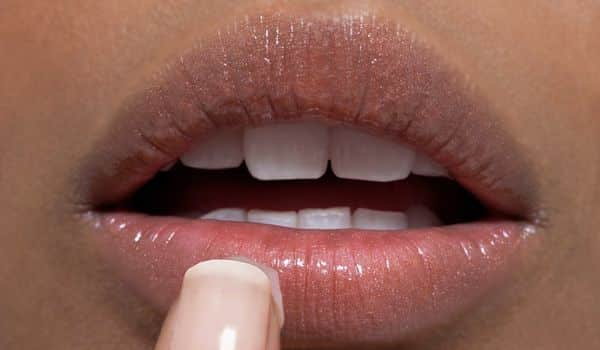
Lip lesions can grow suddenly. In most cases, they are cosmetically unsightly and can affect your self-confidence or self-esteem. Treatment is not only done for cosmetic reasons but it also helps improve your overall health by lowering your risk of getting cancer. Most lip lesions resolve on their own even without treatment. However, if the lip lesion is there for a while and has not disappeared on its own, it is recommended that you consult with your doctor to find out exactly what the lesion is. This helps determine your lip lesion removal options that best suit your cosmetic or health needs.
Signs and Symptoms of Cancerous Lip Lesions
Not all lip lesions are cancerous. However, it is recommended to have any new tissue growth in your lips checked. The following signs and symptoms are associated with cancerous lip lesions:
- Asymmetrical or not uniform
- Irregular borders or shape
- Has more than one colour or shade
- Larger than 6 mm in diameter
- Often changes in size, shape, or colour
Download Dr Mark Gittos’ Guide to Facial Rejuvenation Surgery – Surgical and Non Surgical Anti-Ageing
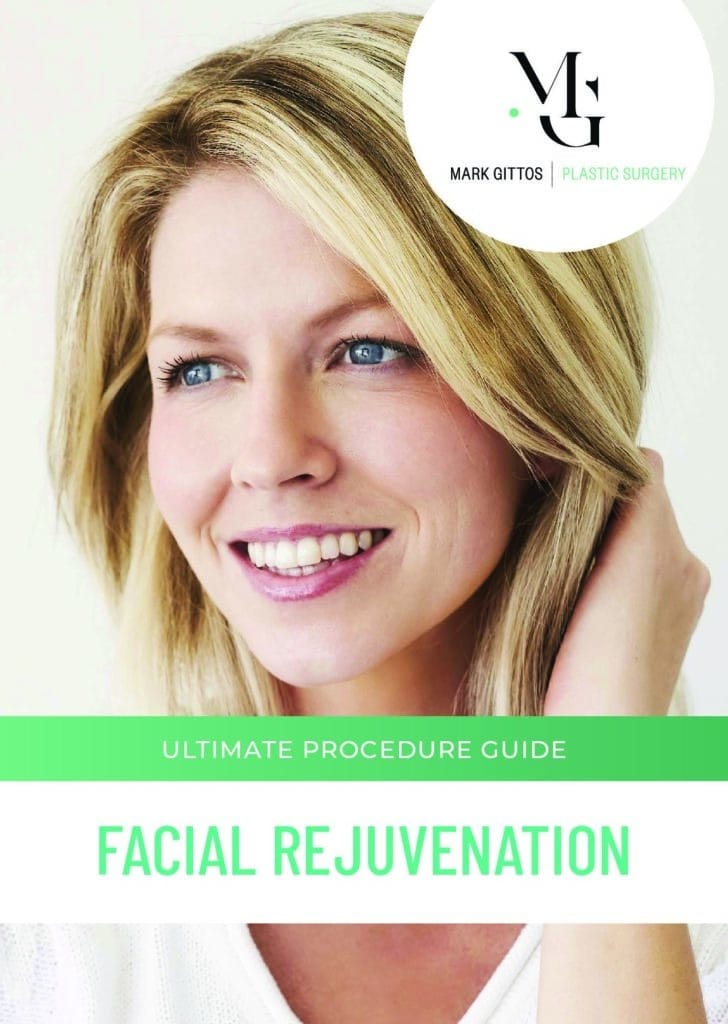
Risk Factors of Lip Cancer
Several factors can increase your risk of getting lip cancer, such as:
- Having a fair skin
- Having an illness that weakens the immune system
- Old age
- Prolonged exposure to sunlight and tanning beds (ultraviolet radiation)
- Smoking
Treatment Options for Lip Lesions and Lip Cancer
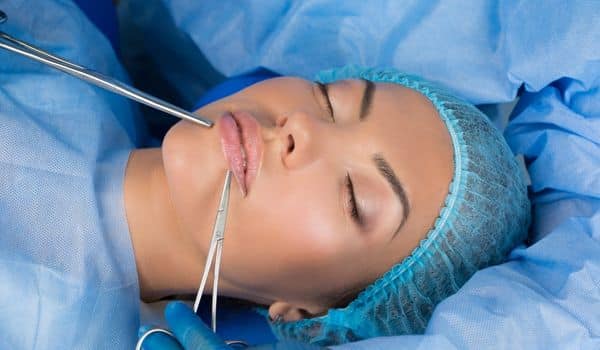
Lip lesion removal surgery is the treatment of choice. Several surgical procedures can be used if you have lip tumours or other lip lesions. In general, your surgeon will use one or more of the following surgical methods:
- Lip Tumour Excision with Primary Closure: this surgical technique is indicated for small lip cancers and benign lip tumours that affect 1/3 of the length of your lips. It involves the use of very fine sutures to close the wound and achieve minimal deformity and scarring
- Lip Tumour Excision with Skin Graft: this surgical technique is indicated for larger lip tumours and other lesions that would deform the lips when removed completely. It requires the use of a skin graft (skin is removed from a part of the body) to close the wound. This technique prevents a crooked lip and smile once the surgical incisions healed completely
- W-Plasty and Z-Plasty: these advanced surgical techniques are used to reconstruct the lips following the removal of the tumour. As the names imply, the shape of the surgical incisions is W or Z depending on the size of the tumour and the preference of the surgeon. Using these techniques lowers the risk of skin contraction, mouth deformity, and unwanted scarring
- Mohs surgery: this surgical technique involves the removal of thin skin layers one layer at a time and examining each layer using a microscope to determine if any malignant tissue is left. Once the surgical area is free of cancer cells, the surgeon will close the wound or reconstruct the lips. The advantage of this technique is that it allows the surgeon to remove as little tissue as possible (just enough to treat cancerous lip lesions)
If you have benign lip lesions, non-surgical treatments are usually recommended. The procedure will greatly depend on the type and size of lesion you have. In general, the following methods may help address non-cancerous lip lesions:
- Laser removal: also known as laser therapy, it involves the use of a medical laser device to generate a controlled amount of heat energy to burn away small lip lesions
- Cryotherapy: also known as freezing therapy or cold therapy, it makes use of liquid nitrogen to freeze and destroy abnormal blood vessels as well as a small area of normal skin
- Radiotherapy: also known as radiation therapy, this treatment uses high-energy x-ray or other particles to destroy malignant cells
- Chemotherapy: this non-invasive method makes use of chemotherapeutic drugs to kill rapidly dividing cells
It is important to know that there are different treatments suitable for various types of lip lesions. During your consultation, the optimal treatment plan for your condition will be discussed. You will also be provided with lip lesions pictures and other information on alternative treatments specific to your needs.
How to Prepare for Lip Lesion Removal Surgery

During your first visit, your surgeon will conduct a thorough assessment of your lip lesion, expectations, and overall health to create a customised treatment plan that will best suit your needs.
Before the surgery, you will be advised to:
- Stop smoking
- Stop taking blood-thinning medications and supplements to prevent bleeding during the procedure
- Avoid tanning beds and prolonged sun exposure
Recovery after Lip Lesion Removal Surgery
The surgical wound on your lips will take around a week to heal. Usually, you can resume your work and daily activities after 1-3 days. However, you will need to avoid contact sports. You may feel mild lip tightness in the first few days but this will just disappear after a few weeks. Any discomforts that you may feel can be easily managed by over-the-counter pain medications and the application of an ice compress.
FAQS about Lip Lesions

What causes lesions on the lips?
Lip lesions are very common and can be caused by several factors. The most common causes are the following:
- Injury: unintentional biting, chewing of the lips, or improper use of dental hygiene kits (brush or floss) can result in small cuts on the lips
- Infections: bacterial, fungal, and viral infections can cause soreness or swelling on the lips
- Certain medications: some drugs may cause rashes on the lips
- Defective dentures: incorrect fit (loose or too tight) dentures may cause lesions on the lips
- Unhealthy habits: cigarette smoking and consumption of alcoholic beverages can cause irritations on the lips
- Too hot foods or drinks: they can cause lip injury, leading to the formation of lesions
How do you treat a lip lesion?
Lip lesions can be treated by the following:
- Avoid sharing utensils to prevent transmission of microorganisms
- Avoid touching the lesions to prevent infection
- Eat or drink cold foods to lessen irritation, pain, and swelling
- Gargle with salt water to achieve temporary relief from pain or discomfort
- Have regular dental appointments
- Maintain good oral hygiene by brushing at least twice a day to treat the underlying cause of lip lesions
What does cancer on the lips look like?
- Lip cancer may appear differently from one person to another. In individuals with lighter skin tones, the lesion may look reddish. In individuals with darker skin tones, the lesion may look grey or dark brown. However, these lesions won’t heal or just worsen over time. So, if you detect something unusual, it would be best to consult with your doctor immediately.
What is a lower lip lesion?
- Lower lip lesions are abnormal tissue on the lower lip. The most common lower lip lesions are called mucocoele. It is a fluid-filled cyst found in the inner portion of the mouth, specifically in the inner part of the lower lip. Inner lip lesions like mucocoele can also appear in the tongue, gums, floor of the mouth, or inner cheeks. These blisters are usually not dangerous and are painless.
What are the 3 types of lesions?
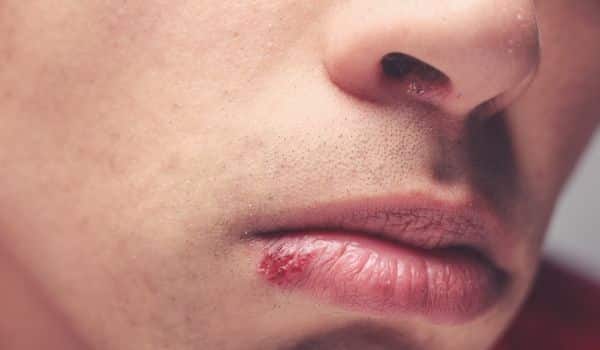
The three types of lesions are:
- Fluid-filled lesions within the layers of the skin (pustules and vesicles)
- Solid mass lesions (tumours and nodules)
- Flat lesions (macules and patches)
What does a lesion look like?
- A lesion is an abnormal bump or patch on the skin that may be of different colour or texture compared to the skin around it. It may be benign or malignant.
What does a cancerous lesion look like?
- A cancerous lesion may appear scaly, rough, oozing, or bleeding and won’t heal. There can also be changes in the colour, size, or shape of the lesions.
Is a lesion a tumour?
- A lesion is described as an area of damaged tissue from an injury or disease. All tumours are lesions; however, not all lesions are considered tumours.
What causes lesions?
Lesions may be caused by any of the following:
- Allergic reactions
- Diseases
- Genetics
- Medications
- Sun exposure
What are facial lesions?
- They are abnormal bumps or patches on the face. Facial lesions can also appear as a crack, sore, or abnormal discolouration of the skin.
Are skin lesions cancerous?
- Not all skin lesions are cancerous. Some may be benign or non-cancerous. To determine whether a skin lesion is cancerous or not, a biopsy is needed.
What do benign skin lesions look like?
Benign skin lesions have the following characteristics:
- Grow slowly over time
- Have a uniform appearance
- Stable
- Symmetrical
- Well-circumscribed
What is this spot on my lip?
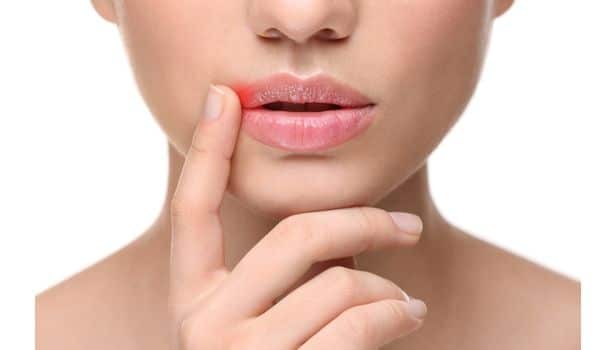
There are many causes of lip spots. This condition can vary in size and colour. The following conditions are related to lip spots:
- Acne
- Allergic reaction
- Cherry angiomas/senile angiomas (small ruby-red, raised spots)
- Chickenpox
- Cold sore (contagious lip blisters)
- Filiform warts (small, long, narrow growths)
- Hand, foot, and mouth disease
- Impetigo (a highly contagious skin infection)
- Lip cancer
- Milium (cysts that look like whiteheads)
- Mole
- Perioral dermatitis (red rash on the mouth area)
- Venous lake (small soft bluish lump)
What is this small bump on my lip?
Lip bumps may be painful or comfortable. In most cases, they are non-cancerous and will resolve on their own without medical treatment. There are several causes of small bumps on the lip, including:
- Allergic reactions
- Canker sores
- Cold sores
- Fordyce spots (small white or yellowish lip spots)
- Hand, foot, and mouth disease
- Infections
- Lip dryness
- Lip injuries
- Milia
- Mucoceles (fluid-filled cysts on the lips)
- Oral cancer
- Oral thrush (a fungal infection characterized by slightly raised, creamy white patches on the mouth)
- Perioral dermatitis
- Stress
- Sunburn
- Syphilis (a sexually transmitted infection that causes lip sores)
What do infected lips look like?
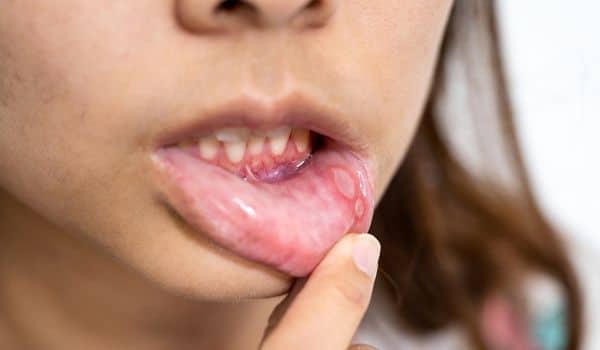
Infected lips may look different depending on the cause of the condition. In general, they have a different colour than the surrounding tissue and pus may drain from the affected area. Pain and swelling may also occur.
There are several conditions that can lead to lip infections, such as:
- An allergic reaction to foods or medications
- Canker sores
- Celiac disease (a long-lasting digestive problem that is triggered by eating foods containing gluten)
- Cold sores
- Folate deficiency or anaemia
- Gingivostomatitis (swelling of the mouth and gums)
- Hand, foot, and mouth disease
- Infectious mononucleosis (a viral infection that causes fever, sore throat, and swollen lymph glands)
- Leucoplakia (thick, white patches inside the mouth)
- Mouth cancer
- Oral thrush
- Pemphigus vulgaris (an autoimmune disease that causes blisters on the skin and mucous membranes in different body parts)
- Trauma or burns
How long do oral lesions last?
- In most cases, oral lesions resolve in 10 to 14 days, even without medical treatment. Some lesions may last up to 6 weeks. However, some lesions need topical treatment such as an antibiotic ointment or gel for them to completely go away.
Are all mouth lesions cancerous?
- Most mouth lesions are not cancerous. Around 1 out of every 100 (around 1%) mouth lesions are considered cancerous. Lip cancer commonly affects the lower lip than the upper lip. If you notice anything unusual in your lip area, it is best to seek medical help immediately.
Further Reading – Medical References about Lip and Skin Lesion Removal
- Slideshow: Causes of Skin Lesions – WebMD
- What Skin Cancer & Precancerous Lesions Look Like – WebMD
- Skin lesions: Pictures, treatments, and causes
- Surgical options for treatment of lip and perioral tumors: report of 5 cases*
About Dr Mark Gittos FRACS (Plast) – New Zealand Plastic Surgeon
Practice locations in Herne Bay Auckland, Northland and Bay of Plenty – Kerikeri, Whangarei, New Plymouth & Tauranga
Dr Mark Gittos is a leading Specialist Plastic Surgeon and operates a practice in Herne Bay, Auckland and in the UK. The practice focuses on both surgical and non-surgical procedures, each designed to help restore, improve or change a physical characteristic or problem. The first step in every case is to talk through your personal requirements and explore all the options, before deciding on the most effective solution.
Dr Mark Gittos offers high quality, natural-looking cosmetic surgery results and is highly experienced in Breast, Body and Face Surgery having performed over 4000 Surgeries in the last 26 years. With worldwide expertise Dr Gittos is an expert in breast, face and body surgery for men & women.
Naturally, before any treatment is begun, we will explain clearly the advantages and risk factors; so that you have the information you need to make an informed decision that is best for you. Visit the practice to find out more.

NEXT STEPS
Please NOTE: Dr Gittos only performs surgery on non-smoker patients with a BMI less than 30. To check your BMI please visit the NZ Heart Foundation website. For help giving up smoking before surgery visit the Smoke Free website
Do your Research
- Read the Website and Blogs relevant to your procedure
- Browse our Frequently Asked Questions including how to choose a Surgeon for your procedure
- Download and read the FREE Guides to Surgery
What to Bring to your Plastic Surgeon Consultation
- Bring a friend or relative to help discuss the information and your choices
- Take lots of notes and read the documents provided thoroughly
- Dress in simple clothes as you may need to undress for examination
- Bring your medical referral and any relevant medical documents or test results
Book your Initial Surgery Consultation
- A Referral from your GP or specialist is helpful but NOT essential – you can have a consultation without a GP Referral
- Email us or Call on 09 529 5352 to arrange your surgeon consultation appointment.
- Book a consultation with Dr Gittos by paying the Consultation Fee – $325 incl GST
Traveling for Surgery? – Consider post-surgery luxury recovery in a Hotel with LuxeCare
Please contact us to arrange to book a consultation with our Specialist Plastic Surgeon or to speak with our Patient Care Advisor.
Send an enquiry form today or phone 09 529 5352 during Clinic Hours
